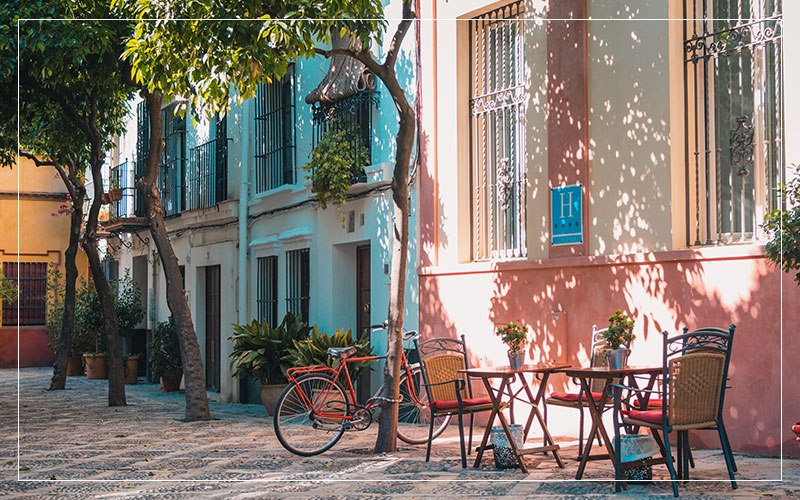Teaching English in Spain
Spain is one of the most popular countries that people go to when they are looking to teach English abroad. Not only is it close to the UK but it also offers workers the experience to work in a country that has amazing weather most of the year. It is ranked the number one country that people choose to work abroad, due to the number of people that travel there annually for leisure, study abroad and even international internships. Spain is also one of the few countries that will accept teachers who just have a TEFL certificate as well as limited classroom teaching experience.

Leisure Time
Attractions such as the Sagrada Familia Basilica are popular amongst both tourists and workers who travel to or near Barcelona. It is a Roman Catholic church and well-known attraction due to its unfinished architecture. It was designed by architect Antoni Gaudí in 1883 after the former architect, Francisco de Paula del Villar, had resigned. This meant that Gaudí was left to finish building the church for the remainder of his life until his death in 1926 meaning that only a quarter of the church was completed. Construction stopped on the Sagrada Familia Basilica due to the Spanish Civil War in 1936-1939 which saw revolutionaries setting fire to the crypt where Gaudí was laid to rest. These revolutionaries also got a hold of the building plans and designs for the church itself which had been partially destroyed. This meant that it took 16 years to piece together the plans and designs so that construction could begin again. To this day, it remains unfinished.
Cultural and historical developments such as the development of the Spanish Armada are a huge part of Spanish culture, it was a fleet of around 130 ships all sailing under the command of Duke of Medina Sidonia on 21st July 1558 until August of the same year. The goal was to Invade England to overthrow Queen Elizabeth I from the throne and the Protestantism that was present in England at the time. Another goal the Spanish Armada had was to ensure that any engagement or interference that the Spanish Netherlands had with English and Dutch privateering ships were destroyed. The Armada had set sail from Calais but was quickly dispersed by an English fireship that had sailed from Plymouth meaning that many of the crew of these ships abandoned the meeting point they were supposed to have with Parma’s army. Ultimately, the Spanish Armada failed to overthrow Queen Elizabeth I as well as the Protestantism in England therefore meaning that only around a third of the 130 ships that were sent out, returned to Spain in the August of 1553.

Food and Drink
Another reason for the popularity that Spain enjoys! Some popular dishes include Patatas Bravas which is fried potato cubes dipped in a spicy sauce that varies in level of spice depending on where you are in Spain. Paella is another example of a popular traditional food, it consists of rice and with chicken, rabbit or sometimes seafood and it originated from Valencia. Another popular food amongst foreigners is Calamares Fritos which, in English, is the Spanish version of deep-fried battered squid. It is usually served with a fresh lemon.
Popular drinks both alcoholic and non-alcoholic include Sangria and Tepache de Piña. Sangria is an alcoholic drink often served in a pitcher, it contains various ingredients such as mint, fresh fruit, and fruit juice to compliment the red wine base. Tepache de Piña is a non-alcoholic drink made from pineapple and brown sugar. Spanish people let the drink ferment for at least 48 hours before serving it.

Some travel and safety tips I would recommend looking into are Entry requirements, Health and safety and Local Laws and Customs. Additional information is available on gov.uk/foreign-travel-advice
Entry requirements
Entry requirements for Spain are quite relaxed for UK visitors however there are a couple of factors that are important to take into consideration when travelling. When working abroad in Spain, you will need a working visa however if you are visiting for leisure and less than 90 days then it isn’t required for you to have a visa. Your passport must be valid for less than 10 years since it was issued and for a minimum of 3 months after the date you plan to leave the country. If you are entering the Schengen area, it is important that you get a passport stamp from the border guards to show that you are complying with the 90-day visa free rules.
Coronavirus is still an issue in Spain, and they still have some measures in place in order to prevent the spread of Covid-19. For example, they ask that the public still wear face masks when aboard public transport, inside a pharmacy or medical centre and care homes. They also encourage people not to meet in large groups but if necessary to maintain the social distancing rule of at least 1.5m. Spain also allows travellers from the UK to show their Covid-19 vaccination record, but they don’t accept any form of appointment card since it doesn’t show proof of vaccination. This links to Spain’s entry requirements because travellers are asked to show proof of one of the following before they can officially enter the country: a negative PCR Covid-19 test, a vaccination card or record and finally a medical certificate that proves you are negative from Coronavirus if you had it in the past year. Spain, for the most part, is happy to allow foreign travellers to visit, however this all depends on where you are travelling from as it may heighten your travel restrictions and border control.
Health and Safety
Natural disasters are not very common in Spain however when there is a case of extreme weather it will either be flash flooding or forest fires. Between the months of October and November is when Spain tends to have the most rainfall (around 48mm) and therefore this could lead to flash floods after the dry summer months. Forest fires occur the most in the Spanish islands like Tenerife and Majorca during the summertime which means that those who visit these destinations must take extra care. Temperatures reach an average of 37°C as the highest and the lowest temperature of 29°C between the hottest months of June-August. Extra information is available through the link provided weatherspark.com
Local Laws and Customs
There are local laws and customs that a foreign worker must follow. UK travellers are not allowed to take any food or drink into Spain that contains meat or milk, apart from infant and pet food that the child or animal must take for medical reasons. Another law is that anyone under the age of 18 is considered to be a minor and therefore must be accompanied at all times by a guardian, otherwise they may be taken note of by the Spanish authorities and in some cases sent to a minor’s centre. If asked by a police officer or Spanish authoritative figure to provide them with ID, it must be done straight away otherwise it could be seen as disobedience with regards to not following police instructions. If a working traveller is found to be in possession of drugs and alcohol, they may get into trouble with the Spanish police and may risk getting arrested and put in a detention facility or prosecution depending on the severity of the drug possession. Alcohol is held in a similar regard as anyone found to be drinking in public places in Spain will be issued a fine on the spot by the authorities.

Recruitment
Companies such as TEFL work with programmes like Meddeas who in turn work with English teachers from both EU countries and countries outside of the EU. They help those involved with several things such as the following: monthly grant of €930 to €1,162 depending on the number of teaching hours, training, and workshops to prepare you for the job. Spanish public health care coverage, they help workers open bank accounts with any banking provider in Spain, paid school holidays apart from the summer holidays and finally, they give you the option to either live with a host family in Spain or they will help you find independent housing. They encourage applicants to reply to any notifications from the company itself super quickly as they usually tend to have a few spots available for workers to start working with the programme.
On an average, the teacher will be with a class of 15 students aged 2-18 years old depending on which age group you would like to work with. With the Meddeas programme, English teachers work for 20-24 hours a week, the contract length lasts up to 10 months. More information is available on their website which is tefl.org

Things to consider
Working abroad can be extremely rewarding and a great life experience to help you gain the confidence and skills you may not have had beforehand. However, there are some things you should consider before travelling abroad for work.
- Culture shock may occur whilst working in Spain, siestas for example are a completely different practice to the UK. It would be beneficial for the worker to research daily routines and traditional to familliarise themselves with the lifestyle.
- Financial stability may fluctuate depending on where the worker has chosen to live in Spain so it may be beneficial to save some money before travelling and to speak to their company about their contract and location.
- Discrimination as a foreign worker may occur on rare instances despite English being the main language that tourists use, in the rural parts of Spain they may not be accustomed to English so it would be in the travellers interest to learn a bit of Spanish before they travel.
Written by Ellie-Mai Foley




